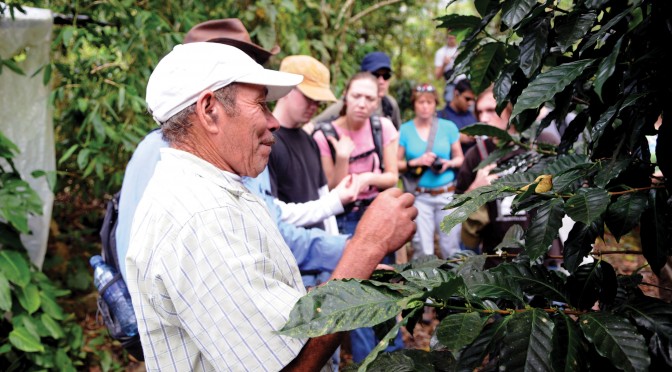Studying abroad—is it even an option for math and science majors? Professor John Zobitz of Augsburg College believes that it should be, and is designing a projects-based calculus course for NCSCE’s Engaging Mathematics initiative with this belief in mind.
“Because STEM coursework is highly structured,” Zobitz says, “many students [majoring in a STEM field] cannot make study abroad work.” He explains that his new calculus course will address this issue by integrating travel into the curriculum, making trips relevant to what his students are learning.
The inspiration for the course comes from Zobitz’s own experience abroad. In the spring of 2012, during Augsburg’s spring break, Zobitz, along with fellow math professor Tracy Bibelnieks, led seven math students to Nicaragua. The group spent most of their time at the Fair Trade Certified™ GARBO Coffee Cooperative, located in Peñas Blancas (Spanish for “White Rocks”). Though relatively unknown to tourists, the area, located in northern Nicaragua, boasts geographically interesting and visually arresting white cliffs, as referenced by the town’s name.
At the time of the group’s visit, GARBO was planning to open their family-owned farms to eco-tourists. Eco-tourism would not only generate additional, more stable revenue for the Cooperative, it would also allow GARBO’s women and youth to play a more active role in the community, since they would be responsible for preparing food and managing lodging for guests.
Zobitz and Bibelnieks used GARBO’s interest in eco-tourism as the instructional focus for their week abroad. Students worked with the two professors, as well as with Cooperative members, to model the expenses and profits associated with hosting visitors at GARBO. On the last day of the trip, students presented the results of their study to the Cooperative, suggesting possible enhancements that tourists would enjoy, and recommending investment priorities to the Cooperative’s members.
The benefits of the trip were mutual. Students who may have felt that rigorous course loads excluded them from studying abroad were given the opportunity to travel without having to delay graduation, while members of the GARBO Coffee Cooperative were provided with mathematically sound suggestions for developing eco-tourism. The Cooperative’s women also gained a larger decision-making role as a result of the trip, since students sited the significant contributions women would make by hosting visitors.
Zobitz will let Nicaragua’s specific issues inform project themes for his new calculus course, and will continue bringing his students to the GARBO Coffee Cooperative. The new course’s design and structure, however, will be translatable to other contexts and countries. This transferability will allow Engaging Mathematics’ partners to adapt Zobitz’s curriculum for their own classrooms, based upon their own interests and travel preferences.
By spring of 2014, Zobitz will have discussed curriculum development with his colleagues in Augsburg’s mathematics department. In summer of 2014, he will begin creating the new curriculum and merging it with existing course content. He aims to launch the new curriculum in the Fall 2014 and Spring 2015 semesters.
For more information about Professors Zobitz and Bibelnieks’ trip to Nicaragua, read their write-up in the October/November 2012 issue of MAA Focus. You can also connect with Zobitz and Bibelnieks on Twitter—@ProfZobitz and @DrTBibel, respectively—and be sure to follow @MathEngaging for tweets about Engaging Mathematics partners and projects.
Article originally published by Christine Marie DeCarlo on February 26, 2014.


